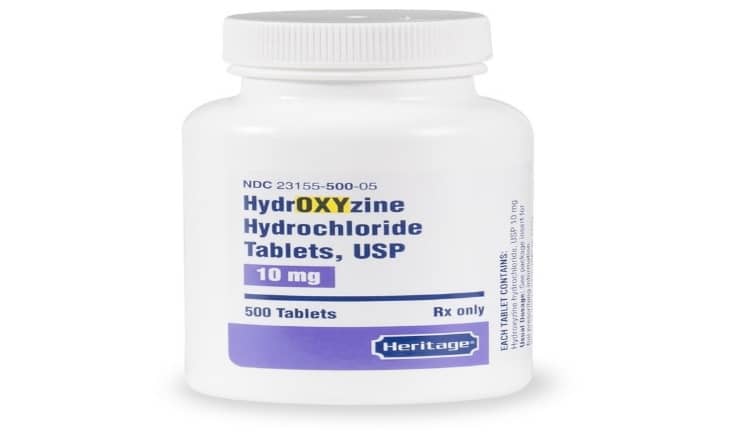Hydroxyzine is a common medication used to treat dogs with anxiety and itching. It’s safe for canines, but you’ll want to make sure it’s administered properly.

In this article, you’ll learn about the uses of hydroxyzine for dogs, potential risks and side effects, how to administer it correctly, and possible interactions with other medications.
Let’s get started!
What is Hydroxyzine?
You might be wondering what hydroxyzine is – it’s a powerful antihistamine that can help soothe your pup’s itching and discomfort. This medication can help to reduce inflammation, redness, and pain caused by allergies or other irritations. It has the added benefit of providing relief from itching as well.
Hydroxyzine works by blocking the action of histamine, which is responsible for causing an allergic reaction in your pet’s body. By reducing the release of histamines from mast cells, this drug reduces swelling and irritation associated with allergies while providing relief from painful itching sensations.
In addition to its ability to provide pain relief and itching relief, hydroxyzine also has sedative effects that may make it easier for your pup to sleep at night.
Uses of Hydroxyzine for Dogs
Hydroxyzine is a medication often used to treat allergies, anxiety, and itching in dogs. It works by blocking the action of histamines, which are released during allergic reactions. This can relieve symptoms such as sneezing, runny nose, and eyes, and skin irritation.
Hydroxyzine can also be used to reduce stress and promote relaxation in anxious dogs, as well as providing relief from itching caused by skin problems.
Treatment of Allergies
Treating your dog’s allergies with hydroxyzine can provide relief from the uncomfortable symptoms they may experience. Hydroxyzine is a popular choice of medication for dogs suffering from allergies due to its cost effectiveness compared to other antihistamines. It is also easily administered orally in tablet form and provides fast-acting symptom relief. Additionally, it is generally well tolerated when given at an appropriate dose, making it a safe option for your pet.

With hydroxyzine, you can be sure that your pup will get the safe and effective symptom relief they need at a cost that fits into your budget. This makes it one of the most attractive options when it comes to treating allergies in dogs.
Treatment of Anxiety
For pets suffering from anxiety, hydroxyzine can provide much-needed relief. Hydroxyzine works by blocking certain receptors in the brain that are related to responses such as fear and panic. It helps reduce or eliminate symptoms of anxiety so your pet can be more relaxed and contented. This is often combined with behavioral therapy and desensitization training for maximum effect.
Hydroxyzine has been proven to be an effective treatment for many types of anxiety in dogs, including separation anxiety, environmental stress, and aggression due to fear or insecurity. It can also help dogs who are fearful of loud noises such as thunderstorms or fireworks. The following table provides a summary of some potential benefits associated with using hydroxyzine for treating anxiety in dogs:
| Benefits | Description |
|---|---|
| Reduction In Fear | Can help reduce the intensity of fearful behaviors |
| Relaxation | Helps relax the dog and make them feel calmer |
| Improved Behavior | Can help improve problem behaviors associated with anxiety |
| Reduced Symptoms | Reduces physical symptoms like shaking or panting |
| Behavioral Modification | Can work together with desensitization training |
Treatment of Itching
If your pet is intensely itching, it could be time to consider a hydroxyzine treatment. Hydroxyzine can be administered orally or topically in the form of a cream.
Before starting any course of hydroxyzine, it’s important to discuss dosage guidelines with your vet and take into consideration factors such as age, weight and breed.
When used properly, hydroxyzine can bring relief from itchiness due to skin irritation caused by allergies or bug bites. It may also help alleviate anxiety since it’s known to have calming properties.

hydroxyzine is an antihistamine, which means that it works by blocking the effects of histamine, a chemical that is released in the body during an allergic reaction. This helps to reduce the symptoms of allergies, such as itching, sneezing, and hives. Hydroxyzine can also have a calming effect on the central nervous system, which can help to reduce anxiety and promote sleep.
It’s important to note that hydroxyzine can have side effects, such as drowsiness, dry mouth, and decreased appetite. If you notice any side effects in your pet after giving them hydroxyzine, contact your veterinarian.
Here are some additional tips for treating itching in pets:
- Identify the cause of the itching. If you can identify the cause of the itching, you can take steps to avoid or eliminate it. For example, if your pet is allergic to dust mites, you can vacuum and dust regularly to reduce their exposure to dust mites.
- Keep your pet’s skin clean and moisturized. Bathing your pet with a mild shampoo can help to remove allergens and irritants from their skin. You can also apply a moisturizing lotion or cream to your pet’s skin after bathing to help keep it hydrated.
- Avoid scratching. Scratching can make the itching worse and can also lead to skin infections. If your pet is scratching, you can try to distract them with a toy or by giving them a massage.
- Consider other treatments. If hydroxyzine is not effective in treating your pet’s itching, there are other medications that can be used. Your veterinarian can help you to choose the best treatment for your pet.
Potential Risks and Side Effects
Be aware that giving your dog hydroxyzine can cause some side effects, like drowsiness, loss of appetite, and dry mouth. In certain cases, it may also lead to more serious complications such as seizures or difficulty breathing. Additionally, the sedative effects of hydroxyzine can be strong for dogs and could lead to a decrease in their activity level and alertness.
While this medication may provide pain relief for your pet, it’s important to be mindful of the potential risks associated with its use. Vomiting and diarrhea, constipation, excessive drooling, loss of coordination, and changes in behavior due to sedative effects are all possible side effects. Decreased activity level and alertness should also be taken into consideration.
Some of the most common side effects of hydroxyzine in dogs include:
- Drowsiness
- Dry mouth
- Decreased appetite
- Vomiting
- Diarrhea
- Constipation
- Excessive drooling
- Loss of coordination
- Changes in behavior due to sedative effects
In rare cases, hydroxyzine can also cause more serious side effects, such as seizures or difficulty breathing. If you notice any of these side effects in your dog after giving them hydroxyzine, contact your veterinarian immediately.

It is also important to note that hydroxyzine can interact with other medications, so it is important to tell your veterinarian about all of the medications your dog is taking before giving them hydroxyzine.
Overall, hydroxyzine is a safe and effective medication for dogs when used as directed by a veterinarian. However, it is important to be aware of the potential risks and side effects before giving it to your dog.
Here are some additional tips for using hydroxyzine safely in dogs:
- Start with a low dose and increase it gradually as needed.
- Monitor your dog closely for any side effects.
- Do not give hydroxyzine to dogs that are pregnant or nursing.
- Do not give hydroxyzine to dogs that have glaucoma or other eye problems.
- Do not give hydroxyzine to dogs that have liver or kidney disease.
- If you have any questions or concerns about using hydroxyzine in your dog, be sure to talk to your veterinarian.
How to Administer Hydroxyzine
Administering hydroxyzine to your dog can help relieve pain, but it’s important to do it correctly. To prevent an overdose, make sure you follow the dosage recommendations provided by your vet or on the package. Depending on the size and weight of your dog, they may need a smaller dose than what is recommended for adults.
It’s also important to give them the correct form of hydroxyzine. For instance, if you have tablets, it’s best to crush them up and mix them in with their food so that they won’t be able to taste it. Make sure not to give them any form of hydroxyzine more than twice a day, as this could lead to serious side effects such as increased heart rate or seizures.
Additionally, always keep track of how much hydroxyzine your pup has taken in order to avoid giving too much at once.
Interactions with Other Medications
It’s essential to be aware of possible interactions hydroxyzine can have with other medications your pup may be taking, as combining them could lead to serious consequences. Drug interactions between hydroxyzine and other medications should always be considered before administering the medication. When in doubt, it’s best to consult your veterinarian for dosage guidelines and drug interactions.
To help visualize possible drug interactions, below is a list of some common drugs that may interact with hydroxyzine when given to dogs:
| Drugs | Interaction Level | Effect on Hydroxyzine |
|---|---|---|
| Amitraz | Moderate | Decrease absorption of hydroxyzine |
| Azathioprine (Imuran) | High | Inhibition of metabolism of hydroxyzine leading to increased levels in blood stream |
| Cimetidine (Tagamet) | Low-Moderate | Competition for metabolism resulting in decreased clearance rate and increase half-life duration |
| Ketoconazole (Nizoral) High Inhibition of metabolism resulting in increased levels in blood stream |
These are just a few examples; there are many more drugs that may possibly interact with hydroxyzine so it is important to speak with your vet about all drugs being administered to your pup. Additionally, talk to your vet if you notice any signs or symptoms that could indicate an adverse reaction from drug interaction such as vomiting or excessive sedation.
SEE ALSO:
- Effective Dog Ear Cleaner: Keep Your Pet’s Ears Healthy and Clean
- Uncover the Benefits of Mary Ruth’s Probiotic for a Healthy Gut
- Nylabone: Unleash Joyful Chewing and Promote Healthy Teeth with the Ultimate Dog Chew Toy
- Discover the Health Benefits of Dr. Marty Dog Food for a Vibrant and Happy Dog
Conclusion
It’s clear that hydroxyzine can be a very beneficial medication for dogs. However, it’s important to understand the potential risks and side effects associated with its use.
Talk to your vet if you have any questions or concerns about administering hydroxyzine and potential interactions with other medications.
Ultimately, understanding how this medication works and how it affects your dog is key to ensuring their health and safety.
With proper use, hydroxyzine can make a great difference in your pet’s life.
“Be a hero and adopt a rescue dog today!

